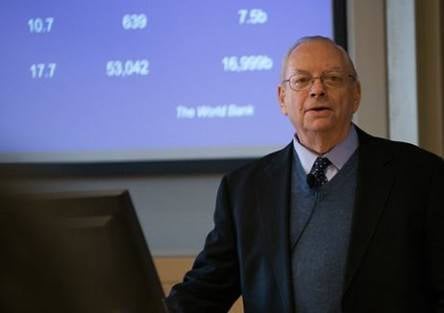March 3, 2015 — Ebola continues to afflict West Africa, with a spike in infections reported in February blamed on unsafe burials. Infectious disease expert Barry Bloom recently looked back at the early days of the current epidemic to dissect the global health response and highlight the contributions of researchers affiliated with Harvard T.H. Chan School of Public Health.
Bloom, who is Harvard University Distinguished Service Professor and Joan L. and Julius H. Jacobson Professor of Public Health, spoke to a Harvard Chan audience on February 23, 2015, as part of the Addressing Ebola series sponsored by the Office of the Dean. Previous lectures touched on efforts to genetically analyze Ebola, and on the humanitarian response to the epidemic.
As of early February, Ebola had infected more than 22,000 people and killed more than 9,000. Most cases occurred in Guinea, Liberia, and Sierra Leone, poorly resourced nations vastly unprepared to provide emergency medical care for their citizens—or to negotiate the complex web of agencies and non-governmental organizations (NGOs) currently providing global health aid.
Bloom explained that the World Health Organization (WHO)—the coordinating authority on all international health work—also was not prepared for this crisis. While the agency possesses tremendous convening power to bring together experts, its complex and bureaucratic structure make rapid response difficult. WHO’s budget is small and largely allocated to existing priorities, Bloom said, leaving scant funds to tap in a crisis. Cutbacks that occurred prior to the epidemic eliminated key staffers and further hampered the response. Local field offices failed to grasp the significance of the epidemic in the early months, and key information failed to make it up the chain to higher levels in a timely manner, Bloom said. By the time it did, the epidemic was raging.
WHO has acknowledged its own failings and in January passed a resolution aimed at improving its capacity to rapidly respond to a crisis. Bloom argued that the agency should focus on being a “knowledge organization,” with a well-stocked list of expert first responders to call in when the next health crisis emerges.
Bloom also highlighted important efforts to address the epidemic by researchers affiliated with Harvard Chan School, including a meeting of ambassadors from the affected nations convened by Harvard Humanitarian Initiative Director Michael VanRooyen, a professor at the School, and Associate Professor Pardis Sabeti’s leadership in the effort to sequence the Ebola genome and track its mutations. He also recognized Christian Happi, a visiting scientist who trained as a postdoctoral researcher at the School. Happi has collaborated with Sabeti and Happi’s lab diagnosed the first case of Ebola in Nigeria.
Bloom ended his talk with the hope that “this tragic Ebola crisis will remind everyone that in the realm of health, there is no place from which we are remote, no one from whom we are not connected.”
